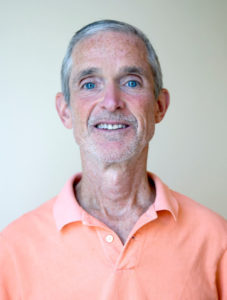 Many of us think of joy as an experience we have when something special happens. We may plan specific activities, such as a vacation, some entertainment or dining out, that we think will bring us joy. This thinking is so prevalent in our culture that we don’t realize how limiting it is, since it is built on an unconscious belief that we need something more to be happy.
Many of us think of joy as an experience we have when something special happens. We may plan specific activities, such as a vacation, some entertainment or dining out, that we think will bring us joy. This thinking is so prevalent in our culture that we don’t realize how limiting it is, since it is built on an unconscious belief that we need something more to be happy.
This month, we decided to practice the understanding that joy is a natural state and we will be exploring what it means to enjoy the present moment and what prevents our enjoyment of it. Sri Swami Satchidananda often spoke about peace and joy as our birthright, our very nature. He encouraged us to think carefully and avoid anything that would disturb that natural condition.
Many things we desire can have that disturbing effect: expecting things to go my way, hoping someone will love me, or counting on some specific outcome from my efforts. In all these cases, I am unconsciously depending on something that I cannot control as the source of my happiness.
Another one of the primary obstacles to experiencing joy is the way we get caught up in our heads—constantly planning, judging, and worrying about ourselves and the things we think will bring happiness. A mind that is preoccupied this way is effectively cut off, both from the heart— where we experience love and connection—and from the present moment, the only moment in which true joy can occur.
When we open our hearts to others and make efforts to serve and give, we give rise to a deep sense of fulfillment that is free of dependency on people or things. And through a practice of Yoga asanas and meditation, we can learn to quiet the incessant activity of the mind and sense an inner peace that is already present. Both sitting still and serving are forms of Yoga practice that can reveal to us an immense potential to enjoy life.
This can be a very rewarding practice but it requires paying close attention. When we find ourselves feeling anxious, disappointed or frustrated, we can ask ourselves, “Am I letting my state of mind, my enjoyment of life, be determined by the events around me? Can I choose to give my best effort, accept the results and be content in this moment? Must I wait to enjoy life?”
When darker emotions arise from deeper hurts and losses, it’s not the moment to cultivate joy or try and slap a smile on. These feelings are a natural part of the human experience, and are strong teachers to be acknowledged. Ultimately, they remind us of the fragility and preciousness of the present moment, and can inspire us to seek the unchanging spiritual presence within.
It’s also important to acknowledge the numerous opportunities to delight in the ordinary miracles that manifest daily around us. Instead of thinking of happiness as the end-result of completing tasks, we can make time to appreciate small, precious moments as we pursue goals. We can pause to take in the smile of a baby, watch a hummingbird in flight, and/or keep company with a slowly darkening sky at dusk.
It inspires me to remember that it is our nature and birthright to experience joy, and that I can choose to enjoy this moment as it is without needing anything to make it better. Even though it may not be easy at times to cultivate this feeling, I plan to enjoy trying.
About the Author:
 Swami Ramananda is the president of the Integral Yoga Institute of San Francisco and a greatly respected master teacher in the Integral Yoga tradition, who has been practicing Yoga for more than 35 years. He offers practical methods for integrating the timeless teachings and practices of Yoga into daily life. He leads beginner, intermediate, and advanced-level Yoga Teacher Training programs in San Francisco and a variety of programs in many locations in the United States, Europe, and South America. Swami Ramananda trains Yoga teachers to carry Yoga into corporate, hospital, and medical settings and has taught mind/body wellness programs in many places. He is a founding board member of the Yoga Alliance, a national registry that supports and promotes Yoga teachers as professionals.
Swami Ramananda is the president of the Integral Yoga Institute of San Francisco and a greatly respected master teacher in the Integral Yoga tradition, who has been practicing Yoga for more than 35 years. He offers practical methods for integrating the timeless teachings and practices of Yoga into daily life. He leads beginner, intermediate, and advanced-level Yoga Teacher Training programs in San Francisco and a variety of programs in many locations in the United States, Europe, and South America. Swami Ramananda trains Yoga teachers to carry Yoga into corporate, hospital, and medical settings and has taught mind/body wellness programs in many places. He is a founding board member of the Yoga Alliance, a national registry that supports and promotes Yoga teachers as professionals.


